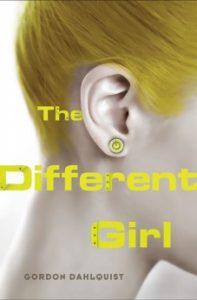
I was lucky to get an advance copy of Gordon Dahlquist’s new novel, The Different Girl, which pulled me in immediately, starting with this quote from the first page:
I’m not sure how old I am, mainly because there are so many different ways to tell time — one way with clocks and watches and sunsets, or other ways with how many times a person laughs, or what they forget, or how they change their minds about what they care about, or why, or whom. And there are times when something happens that you don’t understand — but somehow you still know that it’s important — like walking through a door you only notice when you hear it lock behind.
And he was kind enough to answer some questions about the book.
SR: I’m intrigued that The Different Girl started life as a libretto. How does your experience as a librettist and playwright influence you when you work on a novel?
GD: One factor is that in a play the wider world is conjured up through what people say – which, since the most interesting dialogue leaves many important things unsaid, creates a lot of interesting room for an audience to fill in the gaps. While there’s obviously a lot of conversation in The Different Girl, a bigger theatrical echo is the way much of Veronika’s narrative similarly hinges on what she doesn’t say. Another related point is that in the theatre one writes for a very specific physical situation. Though much of The Different Girl is about making sense of experience – which can seem abstract – to me that impulse is always rooted in Veronika’s reaction to concrete places and actions.
SR: I love how much attention Veronika pays throughout the book to what it means for things and people to be different, and how frequently the word itself appears. At what point did you know that The Different Girl would be the title?
GD: From the very beginning. I almost always have a title in mind before I start to work on a book or play, even before I quite know what the title means – it’s something I’m a little superstitious about. But I don’t tend to work with outlines, or to plot too far ahead, so much of my method is about having ideas in mind that I know I’m going to pursue, so they just naturally get developed as I go on, what I think know changes as the plot and characters expand. My plot outlines are limited to notes like: “V takes noodles to M. They talk.” Once I get a draft, of course, I’ll revise things, but I think it’s important not to know too much beforehand – I very much believe that ideas one comes up with on the way are better than decisions made beforehand (if simply because beforehand you don’t know as much). Again, some of this probably comes from playwriting. I can’t write page five of a conversation without writing pages one through four to reach it – I can have an idea of course, but not the actual words, because the actual words arise organically from what’s come right before.
SR: When Veronika says, late in the book, “I had learned to see possibility,” it made me think about seeing narrative possibility, and about how much of the way we understand ourselves and the world is based on the stories we tell about our experiences. Is that relationship, between experiencing something and interpreting it through story, something you deliberately kept in mind, or am I just projecting?
GD: Not at all – I very much share that sense of connection between narrative and understanding. It’s a frequent theme in my writing, and something I’m fascinated by, just in life – the relation of a society to its stories, how narrative strategies relate to our thinking, and to our values. Obviously a big thread running through The Different Girl is Veronika’s growing understanding of context, identifying the various factors that define her experience and how they inform one another, how story creates meaning. Because of Veronika’s nature, maybe those ideas are a little more visible – or maybe it’s that her nature allows me to create a character who’s as interested in those ideas as I am.
SR: It seems like more stories could be told in the world of The Different Girl. Would you want to return to it? And of course: what’s next for you? What are you working on now?
GD: I’ll answer these together, because they’ve become connected. I don’t have any intention, at least right now, to continue with the characters in The Different Girl – that story seems finished to me. That said, the climate in which it takes place does open up a lot of possibilities, and after kicking that prospect around for a while, I’ve started another novel set in that larger world. It’s also a science-fiction story, presently titled Second Skin, and explores the part of that world where Robbert and Irene might have come from, though from a very different perspective than either of them.

The Next Big Thing Blog Hop « lacquer-sforza.net
February 8, 2013 at 11:57 am[…] Also, I got a chance to talk to YA author Sara Ryan recently, after she’d read an advance copy of The Differnt Girl, and she posted our back-and-forth at sararyan.com. […]